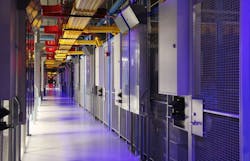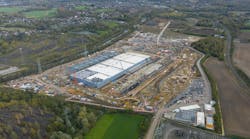Equinix is Exiting Some Leased Data Centers in Major Markets
Equinix is exiting leased data center space in four major markets across the U.S., and plans to migrate customers to newer Equinix facilities in the same cities, the company has confirmed.
The digital infrastructure specialist will not renew leases in a number of carrier hotels and data centers that no longer meet its engineering and sustainability standards, or simply have no expansion capacity for Equinix and its customers.
The Equinix decision to not renew leases was first reported in Foundations, an industry newsletter focused on interconnection, citing an email to customers about the future migrations. The newsletter said Equinix has decided not to renew leases at eight facilities, including sites in Atlanta, New York, Los Angeles and Silicon Valley. In each city, Equinix has capacity in other facilities to manage customer migrations.
The company said the decision was part of a regular review of its data center footprint to “ensure alignment with both our customers’ needs to interconnect with vibrant digital ecosystems, as well as our long-term strategic business goals.”
“In some cases, the leased properties are in facilities that may not meet the future operational, expansion or sustainability needs of our customers or our corporate standards,” Equinix said in a statement. “As a part of this review strategy, we have identified several sites in the U.S. where, over the next several years, we will not renew our leases and will relocate customer operations from those data centers to modern Equinix facilities in interconnection-rich data center campuses.”
Most of the customer relocation deadlines are scheduled between 2023 and 2025, but the earliest is April 2022. There is a full list in Foundations.
Focus on Modern Facilities
Equinix has always been known for the high standards for its colocation sites. The company would often make improvements to acquired data centers to meet those standards, a process that became known as “Equinizing” a facility.
That appears to be a factor in the decisions on lease renewals, as Equinix continues to experience customer growth and add services like virtual networking (Equinix Fabric) and bare metal servers (Equinix Metal). These trends place a priority on having contiguous space available for expansion, as well as the ability to cool higher-density workloads. These are particular challenges for data centers in urban high-rise buildings, which tend to have smaller floor plates than suburban data centers.
Equinix noted that it is continuously adding new capacity and updating its data center designs. “With 36 major expansion projects underway across 28 markets in 19 countries, Equinix is investing in properties that offer the best opportunity to serve our customers with the latest in data center infrastructure, systems and technology,” the company said.
Aging Data Centers and a Capital Quandary
The Equinix decision highlights some of the challenges facing older facilities. The data center industry has changed a lot over the last 25 years, and many of the earliest data centers were built in a time of very different requirements for IT equipment and energy efficiency.
Data center operators typically invest in maintenance and equipment updates for facilities, but it can be difficult for older sites to keep pace with the growing scale and density of modern data centers.
In a 2018 Infrastructure Masons “Think Tank” session, 100 industry thought leaders from around the globe debated the prospects for older data centers, seeking to identify options and obstacles.
Among the challenges cited in the iMasons discussion was the fact that many older data centers were built to serve customers in urban areas, typically near the central business district. These areas represent a critical mass of customers, but are also among the most difficult environments to upgrade data center designs and make changes to power or cooling systems. Among the issues cited:
- Many legacy facilities have low ceilings, limited fuel storage and lack of options for expelling heat.
- It’s difficult to run new fiber to support requirements for next-generation networking requirements.
A common concern is that focusing on extending the life of older facilities represents an inefficient use of capital, and the money would be better spent on new capacity.
One of the factors mentioned by Equinix is sustainability, which is becoming a larger factor in data center providers’ infrastructure decisions. Many customers are prioritizing energy efficiency and access to renewable energy to meet internal ESG (environmental, social and governance) commitments, and newer facilities are more likely to meet those requirements.
Carrier hotels in city centers will continue to be important hubs for data exchange and economic activity, and are gaining new investment through acquisition activity by companies like Netrality, which is enhancing meet-me-rooms and infrastructure in these strategic facilities.
The future of carrier hotels is increasingly shifting to the emergence of 5G wireless and smart cities that integrate information technology into the fabric of city life, using analytics and sensors to better manage cities and make urban life safer, more efficient and sustainable. The long-term future for smart cities brings together the Internet of Things, BigData, artificial intelligence and eventually self-driving cars to change the way we live and do business in major urban centers.
About the Author



